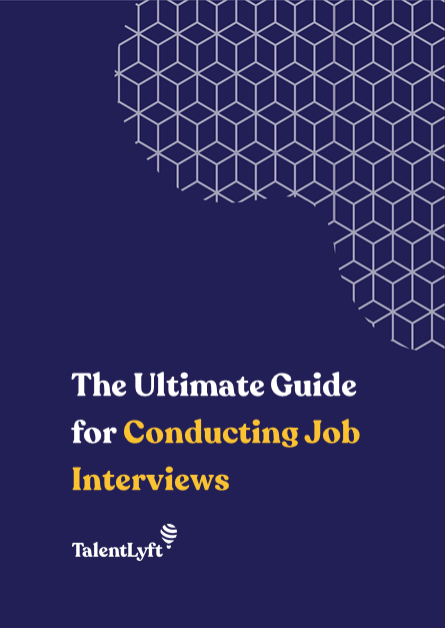![https://adoptostaging.blob.core.windows.net/article/PjCAHfXt3k2gz6UVKuF4oQ.png?9808]()
What are group interviews?
A group interview is the type of job interview in which several candidates are interviewed at the same time.
During a group interview, many candidates are gathered in the same room and they are interviewed simultaneously.
The group of candidates is being interviewed by one or more interviewers.
➡️ Download The Ultimate Candidate Interview & Employee Onboarding Checklist!
Group interview vs panel interview
Group interviews are often mistaken with panel interviews. However, group and panel interviews are not the synonyms - they refer to two different types of job interviews.
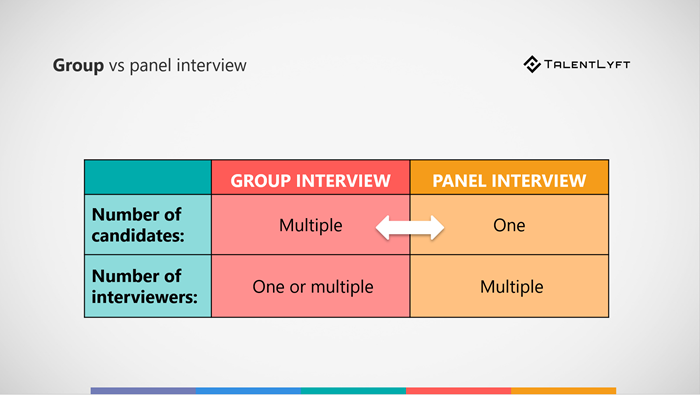
The difference between group and panel interviews is in the number of job candidates being interviewed at the same time.
A group interview is a job interview with multiple candidates and one or more interviewers.
A panel interview is the job interview with multiple interviewers, but only one candidate.
When should you use a group interview?
Group interviews are an especially effective hiring solution in situations when employers:
- Need to fill a position in a tight deadline
For example, group interviews are commonly used for seasonal hiring when employers have a very short period of time to fill open job positions. - Need to hire multiple people for the same position
Group interviews are a fast and affordable solution for situations in which employers need to find several candidates for the same or similar job position. - Have a large number of similar applicants
When employers have a large pool of similar candidates, group interviews are a great way to quickly screen all of them and find the best among them. - Are looking to fill positions where teamwork and stress management skills are crucial to the success
Group interviews are especially useful to fill positions which require great communication skills, teamwork aptitude and stress management skills because they allow employers to see these candidates’ skills in action. - Need to select the top candidate among applicants with no previous work experience
When employers have a large talent pool of candidates with no relevant previous work experience, work simulation exercises conducted during group interviews help employers select the most suitable candidate. For example, group interviews are a great method for interviewing recent graduates.
For which positions should you use group interviews?
Group interviews are a great way to test and select the best candidates for positions which require great communication, interpersonal and stress management skills.
Since group interviews allow interviewers to observe how well candidates work in a group, they are great for filling positions which depend on teamwork.
Thus, group interviews are commonly used to find candidates for positions such as:
...and other similar job positions which include customer service components and interactions with large numbers of clients or the public.
Why conduct a group interview?
Group interviews have many advantages compared to classical, one-on-one job interviews.
Here are some of the most important advantages of group interviews:
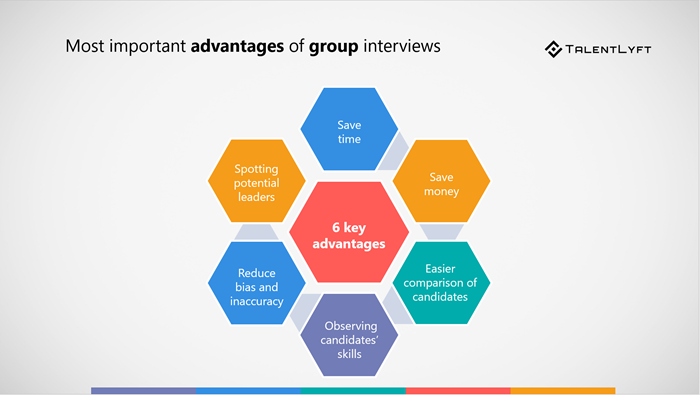
Advantage #1: Save time
Group interviews allow employers to simultaneously evaluate multiple candidates, thus saving the time needed that would otherwise be needed to schedule and conduct an interview with each candidate separately.
Advantage #2: Save money
Group interviews are also more affordable than one-on-one interviews. Interviewing more candidates at shorter time result with a significant reduction of costs associated with interviewing process, including revenue costs and HR professionals’ fees.
Advantage #3: Easier comparison of candidates
Group interviews allow interviewers to observe different candidates in the same conditions, thus making it easier for them to directly compare and evaluate them against each other.
Advantage #4: Observing candidates’ skills
Group interviews allow interviewers to directly observe candidates’ soft skills in action, instead of only relying on what candidates say about themselves. Group interviews offer a unique opportunity for interviewers to test candidates’ teamwork, communication and stress management skills.
Advantage #5: Reduce bias and inaccuracy
Group interviews are often conducted by more than one interviewer. Reduced bias and inaccuracy is just one of the many benefits of collaborative recruiting. Multiple observers of the same candidate behavior are proven to provide a more accurate evaluation of candidates.
Advantage #6: Spotting potential leaders
Group interviews are designed to test how candidates function and in a group setting. Observing the way candidate behave and react in a group and work with others is a great opportunity to spot candidates with distinctive leadership skills.
Types of group interviews
There are two main types of group interviews:
Type #1: Group discussion
In a group discussion interview type, the main focus is placed upon group discussion.
Interviewers present candidates with a certain topic related to the industry or even a specific job-related task and encourage candidates to start a discussion or a debate.
Depending on the size of the group, candidates may be separated into smaller groups to discuss a certain topic. In that case, smaller groups often present the conclusion of their discussion in front of all other candidates.
Type #2: Group activity
The second type of group interview is an interview focused on a group activity or exercise.
Interviewers present candidates with a certain industry-related task or work-simulation exercise and ask them to work together in order to find a solution.
Depending on the size of the group, candidates may be separated into smaller groups to work on a task and solve a problem. In that case, smaller groups often present their solution in front of all other candidates.
Important:
It is important to note that a hybrid of these two interview type is also fairly common. To get the best out of both types, employers sometimes combine them and conduct group interviews which consist of both group discussion and activity.
Group interview structure
To be successful, group interviews must be well planned and executed.
The first step in conducting a great group interview is to clearly define its structure.
Here is the outline of the common group interview structure:
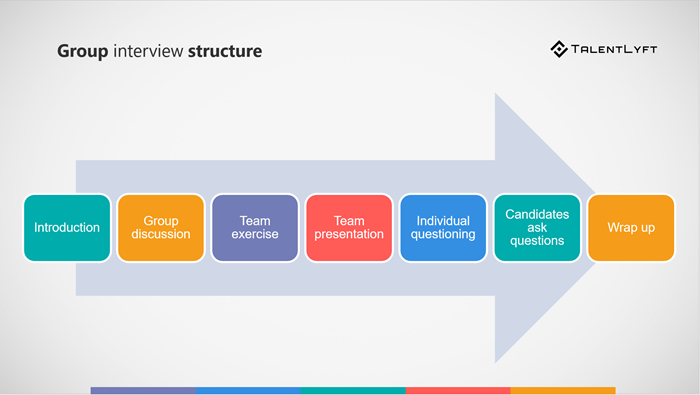
- Introduction
Interviewers first introduce themselves, the company, the job position and outline the interview process and then the invite candidates to present themselves. - Group discussion
A group discussion takes place in a whole group on the topic given by interviewers. - Team exercise
Candidates work in small groups trying to solve a work simulation exercise, role-playing task or analyze an industry related case study. - Team presentations
All candidates come together again in a large group and present the solutions they came up with while working in smaller groups. - Individual questioning
Interviewers ask carefully chosen job interview questions. Candidates answer one by one. - Candidates ask questions
At the end of the group interview, candidates are invited to pose questions for employers. - Wrap up
Interviewers thank candidates for their time and effort and explain the following steps in the selection process.
Group interview duration
Group interviews require more time than regular, one-on-one interviews.
Most common, standard type of group interview is structured to last from 90 minutes to two hours.
In some cases, group interviews can last even longer than 2 hours, depending on the number of candidates and group exercises.
How to conduct group interviews?
Conducting group interviews is much more demanding than leading regular one-on-one job interviews.
Interviewers who conduct group interviews need to have highly developed interviewing skills and possess all the characteristics of a good interviewer in order to be able to spot the best candidate in the group setting.
A good group interviewer should be able to lead and moderate the group and observe individual candidates at the same time, which requires a lot of practice.
Group interviewing best practices
If you’re eager to learn how to be a good interviewer in a group setting, here are some useful tips and best practices to help you spruce up your skills:
Before the group interview: Preparation is the key
Preparation is a key to delivering a successful group interview. To ensure an impeccable group interview preparation, follow these 6 simple steps:
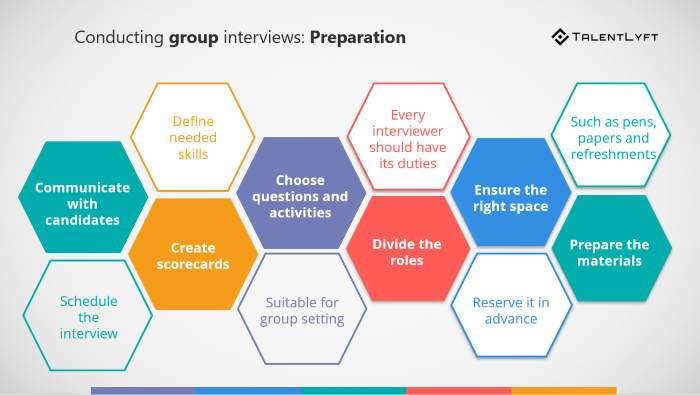
Step #1: Communicate with candidates
Schedule the group interview and inform candidates about the interview date, time, place, format and duration by updating your job interview invitation email template with relevant information.
Step #2: Select the interview questions and plan the activities
Carefully choose the best job interview questions to ask candidates and plan the group interview activities, such as case study, role playing or work simulation group exercise.
Step #3: Create scorecards
Have a firm idea of what skills and attributes you are looking for before you start the interview.Provide a rating sheet or interview feedback sheet to the interviewers ahead of time to ensure that the interviewers are comparing each applicant against the same set of criteria.
Step #4: Divide the roles and duties
If your group interview will be conducted by more than one interviewer, make sure you clearly divide the roles. The best practice is to have one interviewer to conduct and guide the interview, ask questions and give instructions, and other to observe candidates and take notes.
Step #5: Ensure the right space
Choose the right revenue or the location. Go for the space big enough to fit all your candidates and equip the room with enough tables and chairs. After you find the right locations, make sure you reserve it on time!
Step #6: Prepare the materials and refreshments
Prepare all the materials interviewers and candidates will need in a group interview, including paper, pens, printed materials and forms, exercise instructions, interview question list, name tags, etc. Make sure you also prepare small snacks and refreshments.
During the interview: Give instructions and observe
Here is how you can incorporate the best group interview conducting practices in 6 easy steps:
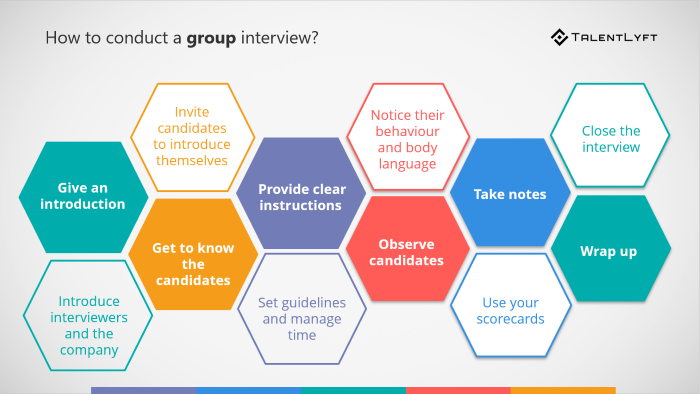
Step #1: Give an introduction
Start by introducing interviewers and providing a brief introduction about the company and the positions for which you are hiring. Proceed by explaining the group interview process.
Step #2: Invite candidates to introduce themselves
Invite candidates to take turns and present themselves in front of the whole group. You can provide an exact introduction format or let them be creative. If you want to help them relax, you can start with a fun icebreaker.
Step #3: Provide clear instructions
Manage the interview by providing clear instructions for group discussion and activities. Break the group into smaller teams. You should also keep track of time and inform candidates when the time for team activities is up.
Step #4: Carefully observe candidates
Carefully observe each candidate. Consider their behavior, not just the answers they provide. The candidate’s body language can also provide important information. Keep track of the way candidates interact with others and the role they take on in a group.
Step #5: Take notes
Interviewing multiple people at once can make it hard to keep track of candidates, their answers and behaviors. This is why it is important to use scorecards. Rely on scorecards to systematically collect all the relevant information.
Step #6: Wrap up
Finish the interview with a brief wrap up. Explain the follow-up process and the expected timeline. Don’t forget to thank the candidates for their time and effort.
After the group interview: Evaluate candidates
After you’ve conducted the group interview, it's time to evaluate your notes and choose the best candidates! Here is how to do it in 3 easy steps:
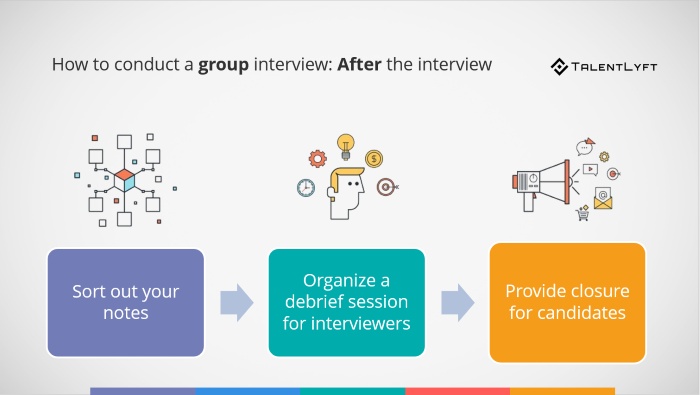
Step #1: Sort out your notes
All the interviewer should go through their notes on their own right after the group interview. That way, their impressions will still be fresh in their mind and they will be able to add valuable comments.
Step #2: Organize a debrief session for interviewers
After the interviewers have sorted out their interview notes on their own, they should all come together for a debrief session. This is the time to hear all the impressions and compare candidates’ evaluation in order to choose the top candidates.
Step #3: Provide closure
Make sure you provide closure for all your candidates. Inform your top candidates about the next steps and timeline of your hiring process. You should also send a personalized post-interview rejection email template to candidates who didn't make the cut.
And that’s a wrap! Now you know everything you need to know to conduct a winning group interview! 🙂
Frequently asked questions
What are group interviews and how do they differ from panel interviews?
Group interviews involve multiple candidates being interviewed at once, unlike panel interviews which have multiple interviewers but only one candidate.
When are group interviews particularly useful?
Group interviews are especially useful for high-volume or seasonal hiring, or when evaluating candidates for roles requiring teamwork and stress management skills.
What are the main advantages of conducting group interviews?
Group interviews save time and money, allow easier comparison of candidates, and provide a direct observation of candidates' soft skills in a group setting.
What structure should a group interview follow for effectiveness?
A structured group interview typically includes an introduction, group discussion, team exercises, individual questioning, and a wrap-up, ensuring a comprehensive assessment.
How do group interviews contribute to the hiring process?
Group interviews enable efficient evaluation of multiple candidates, revealing their teamwork, communication, and leadership skills in a dynamic, interactive setting.










